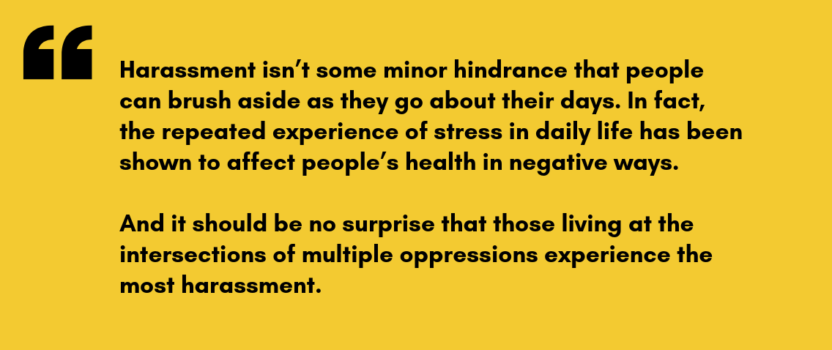Ending Street Harassment Will Take Culture Change
Back in 2012, members of Collective Action for Safe Spaces met with the D.C. Council to discuss how residents experience harassment in the Metro transit system. Metro spokesperson Dan Stessel said in response, “One person’s harassment is another person’s flirting.”
Comments like these underscore why street harassment has remained a frustratingly common issue. Metro’s own 2016 survey found that 21 percent of people faced some type of sexual harassment in the transit system.
And during International Anti-Street Harassment Week, it’s important to shine a light on this issue. Harassment isn’t some minor hindrance that people can brush aside as they go about their days. In fact, the repeated experience of stress in daily life has been shown to affect people’s health in negative ways. And it should be no surprise that those living at the intersections of multiple oppressions experience the most harassment. One study found that 65% of trans people reported harassment in a public space over the past 12 months.
Ending street harassment is part and parcel of CASS’ mission and work. That’s why we run the nine-week program Rethink Masculinity, which engages masculine-identifying individuals to address gendered violence. Applications for our Spring 2019 cohort are being accepted until April 15, so be sure to apply soon.
Without safe access to public spaces, the most marginalized members of our community will continue to face high risks of violence. If your work in the sex trade is criminalized, you face elevated risks of harassment and violence.
We need to create loving and supporting spaces for people who are survivors of harassment and assault. We also need to teach men and masculine-identifying folks that, to quote Darnell Moore, “the bodies of others are not mine; they are becoming of love, respect, care and preservation.”
Diego Quezada is the co-director of Rethink Masculinity, a project of CASS that addresses gendered violence by engaging masculine-identifying people in work to promote healthy masculinities.

